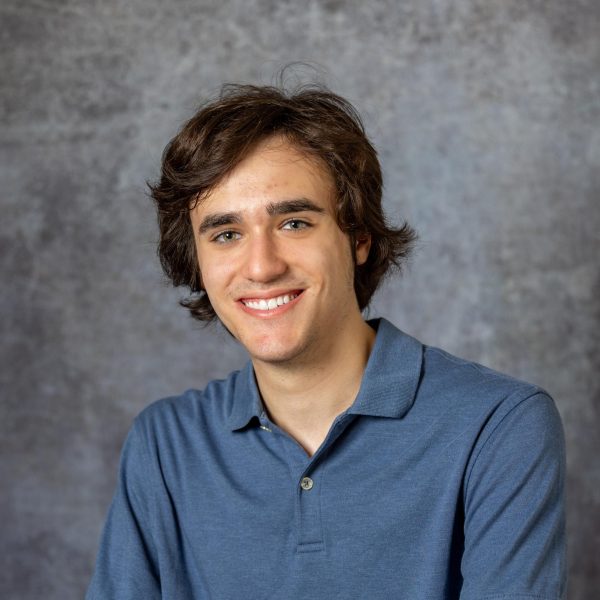What does it mean to write, to read or to be part of a literary community? What are the various roles of literature and how can it influence society around them?
While most do not extensively consider such questions, they dominate literary spheres and incite much debate. Even in the digital age, books and their contents continue to shape their surroundings — and for those interested in writing, reading and even specific issues, literary events provide the opportunity to observe exactly how.
Though many students do not realize it, Madison is home to a thriving literary community, including bookstores such as A Room of One’s Own, Lake City Books and Frugal Muse Books, and hosting multiple authors on the University of Wisconsin campus and around the city. The annual culmination of this literary scene is the Wisconsin Book Festival. Hosted through the Madison Public Library, the Festival runs year-round, though major events took place Oct. 17-20.
What is the Wisconsin Book Festival?
Wisconsin Book Festival director Jane Rotonda spoke about the event’s history and current operations. The Book Festival’s primary purpose is to present free public author events that celebrate books and spark discussion, according to Rotonda.
“Our goal is to talk about authors, talk with authors about books and celebrate reading and community through books, libraries and writing,” Rotonda said.
Rotonda said the Book Festival was created in 2001 but expanded in scope in 2013 once the Madison Public Library Foundation took responsibility for the festival’s leadership. According to Rotonda, the Book Festival has hosted 900 authors since 2013, including multiple New York Times Bestsellers, National Book Award Winners, Pulitzer Prize Winners and newcomers to the writing world.
Rotonda, an alumna of the University of Wisconsin, said she became involved with the Wisconsin Book Festival through her love of reading. Her favorite aspect of directing the festival (and the event in general) is its openness and accessibility — free of cost to attendees.
“There’s nothing like facilitating this event … people are coming together, regardless of their backgrounds or beliefs and are sharing in a special moment that doesn’t require much from them,” Rotonda said.
According to Rotonda, this year’s festival had 57 events across its four days and 69 visiting authors. Rotonda said the events did not have a specific theme in mind outside of being as inclusive and representative as possible.
Legacies in the present
On Oct. 17, the Wisconsin Book Festival hosted authors Tessa Hulls, Margaret Juhae Lee and Zara Chowdhary in a collaborative event discussing their recent memoirs. The event was introduced and moderated by Laurie Dennis, the co-director of UW’s Center for East Asian Studies.
The three authors, who are close to one another and speak frequently, each wrote about their family histories, hence the event’s title — ‘Writing our Lineages.’
Hulls’ work, “Feeding Ghosts,” is a graphic novel-style memoir that addresses intergenerational trauma, the fear of experiencing strong emotions and the importance of relying on others instead of trapping oneself. She said the book partially stemmed from standing close to her mother’s pain and feeling her own.
Lee’s new memoir, “Starry Field,” is titled after a translation of her grandfather’s pen name. The memoir includes the narrative of Lee growing up, looking into how her grandfather’s legacy relates to Korean history and later passing on her family’s story to her children.
Chowdhary discussed her book, “The Lucky Ones.” The work centers around Chowdhary’s experience as a member of a multigenerational Muslim family during the 2002 Gujarat riots in India. The excerpt she read relates to the usage of words to cover awful actions, the theme of safety amidst others’ suffering and how one handles a family’s internal struggles alongside a larger social tragedy.
The three memoirists discussed their varying research into the historical and cultural backgrounds behind their family lives. They said they attempted to fill in absences about themselves and confront the erasure of history. The authors also discussed how writing books can reclaim one’s agency and the cathartic feelings stem from learning about family history. They said adulthood helped them understand their parents and grandparents as represented through their works.
The following event, hosted by the Center for East Asian Studies, featured author Wendy Chen, an assistant professor of Creative Writing at the University of Nevada, Las Vegas, and a member of the editorial board of magazines such as the Tupelo Quarterly.
Chen said her work was inspired by her family’s history during the Cold War in China and it covers multiple characters over different periods of Chinese history. The book originated as an epic poem but became a novel over time.
Chen said she immersed herself in specific times and places during the writing process in an attempt to reclaim what was lost during the Chinese Cultural Revolution. She suggested authors find a very specific audience, as small as a single person, to direct their work toward. In her case, she said she wrote for her childhood self who often wanted to read stories that resembled her family.
Chen said she translates her work and the work of texts written in languages such as Mandarin. According to Chen, one of her favorite aspects of literary events such as the Wisconsin Book Festival is the opportunity to communicate with readers and authors.
“So much of being a writer is [solitary] … going to book festivals is where you get to see the life of your work take off without you,” Chen said.
Chen said she combines her majors in creative writing and studio art to imagine her work in a visual space, both in narrative and form. She said she writes best in the early hours of the morning when her surroundings are dark and she can feel as though she is in a dream.
Chen said her upcoming work, “The Magpie at Night,” is a collection of a different form of her translations of Song-dynasty (spanning the 10th and 13th centuries) female poet and essayist Li Qingzhao’s works. According to Chen, translations can vary based on the translator’s interests and interpretation of the work they are transcribing.
“… Even if you try, there’s no way to erase your own voice in the mediums through which the author is speaking,” Chen said.
The four authors each wrote and intended to write very different works, but they shared an interest in documenting the past in a manner unique to their identities.
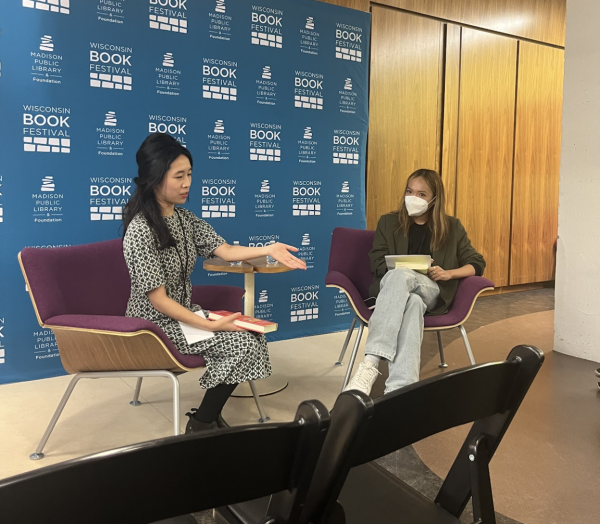
Stories and the environment
The Wisconsin Book Festival hosted internationally bestselling author Rachel Kushner as she discussed her newest work, “Creation Lake,” on Oct. 18. The story, which has been shortlisted for the 2024 Booker Prize, centers around a secret agent’s efforts to undermine a community of environmental activists.
The excerpt from “Creation Lake” that Kushner read evoked parallels between the characteristics of Neanderthals and modern society. Her prose shifted often between comedic commentary and introspective thought, yet managed to stay tonally appropriate.
Kushner said her work includes numerous allusions to real people and places. She said there are no inherent “politics” in people and that an interest in politics builds alongside ego and socialization. According to Kushner, her protagonist, Sadie Smith, is an example of someone who considers themselves outside of the norms of humanity, including a fascination with politics.
When discussing the writing process, Kushner said that when writing characters some require a biography to understand while others do not need one at all. Kushner also said she considers everything written for a book, regardless of if it is kept, to help an author understand their story more.
The Wisconsin Book Festival hosted author Téa Obreht in a discussion of her newest release, “The Morningside,” on Oct. 19. The event was moderated by Professor Porter Shreve of UW’s Creative Writing Department.
“The Morningside” is set in a not-so-distant future dominated by environmental instability. In the excerpt Obreht read, the protagonist obsesses over a case file involving their mother that forms the crux of the story which is told years before its beginning.
Obreht said her environmental world-building relied on research and the deliberate choice of having her protagonist be around 12 years old, therefore having around as much knowledge of the setting as most of her readers. Obreht said another choice regarding her protagonists’ age was to allude to her own sense of cultural inexperience when she moved to the United States at a similar age.
According to Obreht, some of “The Morningside”’s dominant themes include human damage to the environment and the relationship between parents and children. She said her sympathy toward the protagonist’s mother increased after she had children.
“That feeling of … what you can offer your children was present in my space throughout [writing],” Obreht said.
In both their excerpts and discussions, Kushner and Obreht related their works to the current environmental condition of the earth.
Contemporary fantasy authors
Also on Oct. 19, the Wisconsin Book Festival featured Hugo Award-winning author Nghi Vo in a conversation focused on her newest novel, “The City in Glass.” The event was moderated by Gretchen Treu of A Room of One’s Own Bookstore. Vo said “The City in Glass,” set during the fall of a city, required putting herself in the world she wrote. According to Vo, the story was partially inspired by her experience of the COVID-19 pandemic and the subsequent realization that there is no definitive end to the world.
“Every day a world ends, but a new world begins,” Vo said.
Vo said she first became interested in writing as a child when exposed to dictionaries and the ability of words to become building blocks of stories.
Vo, who attended the Wisconsin Book Festival last year, said her favorite aspect of it and similar events is being able to meet fans in a local setting. Vo said she especially enjoys the Wisconsin Book Festival’s dedication to diverse voices and underserved populations.
When asked about her interest in writing fantasy, Vo said she prefers the creative freedom that accompanies stories with magic or fictional beings. According to Vo, writing fantasy is also enjoyable due to its opportunity to blend real-life fun facts with fantastical elements.
“[In fantasy], if I want it beautiful or terrible, I can write it,” Vo said.
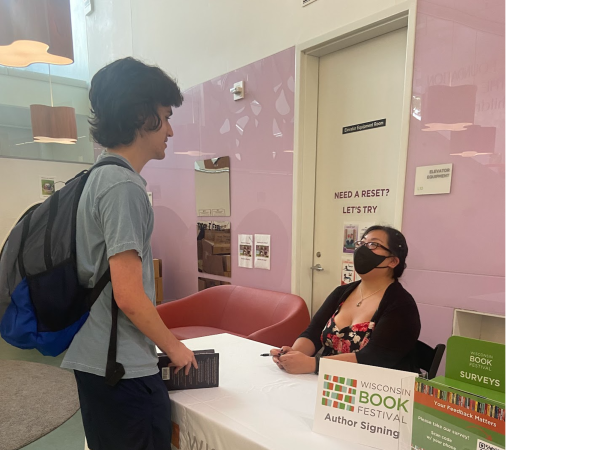
The Wisconsin Book Festival featured another fantasy author and New York Times Bestseller Lev Grossman in a discussion of his new Arthurian novel, “The Bright Sword,” on Oct. 20. The story took around 10 years to complete and stemmed from his fascination with King Arthur.
Grossman said that while it is difficult to determine if King Arthur truly existed, his representation in myths as the ideal king makes him politically relevant today. Grossman’s work explores the Arthurian world after the king’s death and the legacy his actions left behind.
Grossman said he prefers magic in his fantasy stories from his days of reading stories with magical elements as a child, but that magic does not define the genre. A recurring theme of his works, regardless of setting, is the realization of the world’s difficulties.
“[My characters] had to learn important life lessons of the difference between stories and reality,” Grossman said.
Grossman said that while his parents were both writers, he primarily became interested in the industry when he realized his talent for it in college.
Grossman said he enjoyed the Wisconsin Book Festival and similar events due to the opportunity to meet fans despite his isolated lifestyle. He also appreciated the opportunity to speak with fellow writers, including one of his inspirations Neil Stevenson, Grossman said.
According to Grossman, stories set in fictional settings can nonetheless represent real-life political issues. He said he was partially drawn to the story of King Arthur due to the figure’s relationship with modern political issues such as nativism.
“People underestimate the power of fantasy to speak directly to the kind of world we live in,” Grossman said.
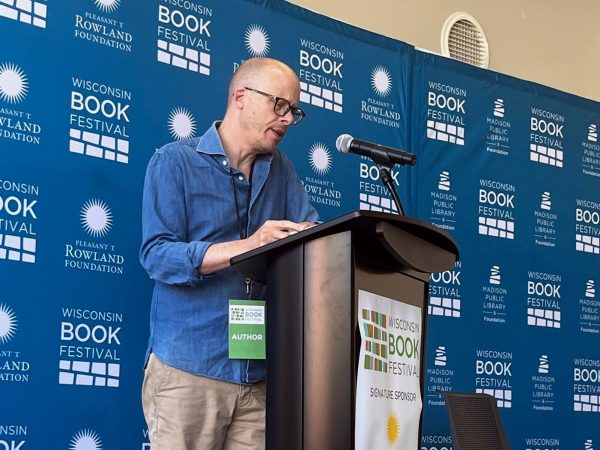
Politics and literature
The Wisconsin Book Festival hosted author and political journalist Joseph O’Neill as he discussed his novel “Godwin,” on Oct. 19. The book’s narrative, consisting of two brothers searching for an African soccer prodigy, is inherently tied to political and social concepts such as colonialism and masculine attitudes, O’Neill said.
One of “Godwin”’s narrators is female, a decision made as a result of exhaustion with masculine voices in politics, O’Neill said. A substantial portion of the narrative rests on a Black character’s experience with a “white savior” and the complicated dynamic that follows.
O’Neill’s reading of “Godwin” showcased his ability to write in a stream-of-consciousness style. His narration read satirically, poking fun at the absurdity of modern ideas of masculinity, misogyny and racism. He said authors can write perspectives that are not necessarily their own. One of his protagonists, while not a bad man, is the unfortunate product of corporate greed.
O’Neill said he considers “Godwin” a political book, but also that all novels fit under that label.
“If you’re a political reader, then the novel you’re reading is a political novel,” O’Neill said.
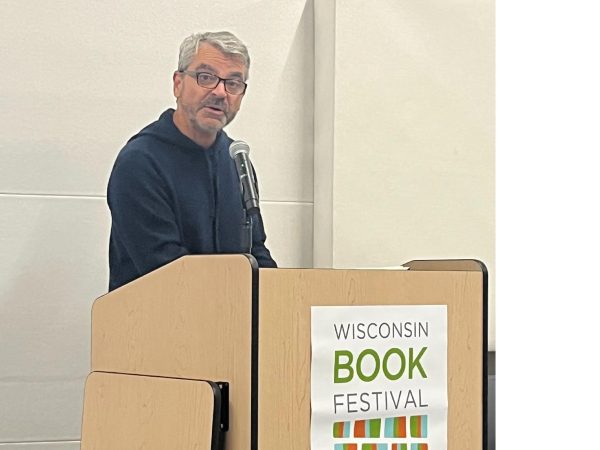
Advocacy through writing
The Wisconsin Book Festival hosted Palestinian poet Mosab Abu Toha in a reading of his newest collection of poems, “Forest of Noise,” on Oct. 19. Most poems in the book were written in the last year and describe real people, Toha said.
Poems Toha read included “Dreams of a Child,” which contrasts the speaker’s childhood innocence with their current despair, “Under the Rubble,” describing those whose bodies are buried by debris, “My Library” which equates the speaker’s ability to write with advocacy and many more. Toha’s poems express his experiences so he can do his responsibility as a witness and artist – providing a different perspective from mainstream journalism.
“The stories I know are absent from the presentation of the Palestinian issue,” Toha said.
Toha also discussed the events leading up to the ongoing war in Gaza, as well as his efforts to build a library for Palestinians in the Gaza Strip.
He has partially written in English to draw attention to many Western nations’ compliance with the ongoing conflict in Palestine.
“English is the language of loss and death to me,” Toha said.
Wisconsin Book Festival’s impact
Jane Rotonda said students should attend the Wisconsin Book Festival and similar events to feel a sense of the greater Madison community. The festival’s events provide students with the opportunity to connect with the world of academia and find their own perspectives on important topics.
“To have students engaging with the Book Festival … is only going to strengthen what we do in the future and how we amplify [young] voices,” Rotonda said.
Students can pitch ideas for Book Festival events and volunteer from behind the scenes. Rotonda said simply engaging with events, such as asking questions of authors, can amplify the overall success of the Book Festival.
The Wisconsin Book Festival provided an extensive schedule of engaging literary events, all thoughtful and inclusive. A diverse array of writers presented their perspectives on works fictional or inspired by their lives, each representing different definitions of what literature means.
Perhaps the effect of events such as the Wisconsin Book Festival is to allow attendees to reach their own conclusions about reading, writing and the world around them.



